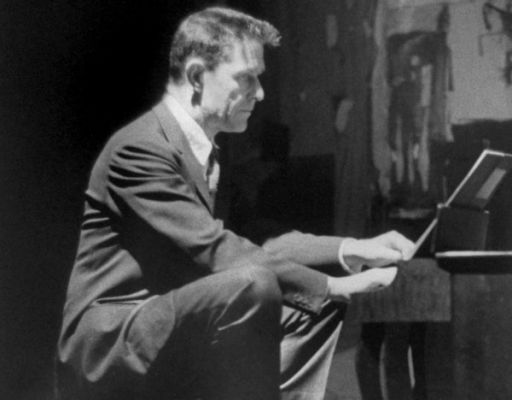Home > Home - Featured
01/25/2016
John Cage: 'Everybody's Cage' Reel Music Festival 2016, Saturday
By INESSA // He said, “In the stillness of the universe we hear the ‘sound’.”He is urging us to “explore, not explain,” urging us to not fall into old habits, and reminds us over and over that it’s neither silence or sound..it’s ALL music.
Reel Music is in its 33rd annual edition. Curation has been going all year and as always new pieces and those timeless classics are part of the Festival palette. No matter what your musical passions are, so many are represented here, including jazz, blues, soul, opera, and avant-garde. That is our stop, right here.
EVERYBODY’S CAGE
DIRECTOR: SANDRA TROSTEL, GERMANY, 2015, Saturday, January 30, Whitsell Auditorium, tickets.d
When John Cage (1912-1992), one of the most influential composers of New York’s 20th century avant-garde, was asked to summarize himself in one sentence, he said humorously: “Get out of whatever cage you‘re in.” Cage systematically scrutinized the underlying principles of the arrangements in music and society, developing musical forms free of hierarchy, judgmental structures, and the individual taste of the composer. EVERYBODY’S CAGE imagines a conversation with Cage, connecting his musical work with his philosophical thoughts, and considers his principles in the context of the present day. Pianist and composer Francesco Tristano and a small team interpret Cage’s VARIATIONS IV—a score without notes–and perform it in the public environment of New York City, inviting an expedition to a place of tranquility in one of the world´s busiest cities. “If, as the Buddhists say, ‘the mind is a restless monkey,’ EVERYBODY’S CAGE is an invitation to drink some water and listen to the sounds of the jungle.”—Sandra Trostel. (81 mins.)
Yes. We live in a digital age which allows us to follow and develop our creative pursuits and exchange of ideas at the speed of sound. Some might think that only us, here in the 21st century , being so smart in digital machinations and our computer world, are able to achieve such glory. But looking back on those thinkers who have come before, I mean way before us, new trends and ways of thinking have been constantly fomented, developed and presented for creators to consider. John Cage is one of those people and this new film exposes this incredibly original artist in a completely unexpected and highly original film essay.
RETHINKING JOHN CAGE

The composer and philosopher that is John Cage really is a story about sound and how we interpret it. He said, “In the stillness of the universe we hear the ‘sound’.”He is urging us to “explore, not explain,” urging us to not fall into old habits, and reminds us over and over that it’s neither silence or sound..it’s ALL music. All this and more is uniquely explored in “Everybody’s Cage” that connects the music and philosophy that is John Cage. Sandra Trostel, director of “Everybody’s Cage” gives us some background.
When John Cage (1912-1992), one of the most influential composers of New York’s 20th century avant-garde, was asked to summarize himself in a nutshell, he said humorously: „Get out of whatever cage you‘re in.“ Cage scrutinized the underlying principles of the arrangements in music and society systematically. He developed musical forms free of hierarchy and traditional relations on the base of social and philosophical questions – on education, work, government, the process of inner development, on the freedom of movement of a society and its individuals. His compositions are independent from judgmental structures and the individual taste of the composer.
Says Sandra of her film
There is very little space for purposeless thought and activity in today’s highly efficient, tightly scheduled life routines. John Cage’s special perspective on social and philosophical issues made me realize how fruitful and inspiring it can be to explore structures by just taking them in, not only in art, but in all aspects of life. So in retrospect my last 4 years have not just been filled with work on an interesting movie, encountering John Cage was a actually liberating experience. If, as the buddhists say, “the mind is a restless monkey” EVERYBODY’S CAGE is an invitation to drink some water and listen to the sounds of the jungle.
THE MOVIE
EVERYBODY´S CAGE, an imaginative conversation with John Cage, connects his musical work with his philosophical thoughts and confronts them with our present. Together with pianist and composer Francesco Tristano and a small team, we carried out a test assembly on the base of chance, an experiment in four movements. That made a lot of surprising things happen. We interpreted John Cage’s VARIATIONS IV, one of his scores without notes, played in the public environment of New York City. We were granted access to the sanctified Steinway basement where all their best pianos are stored to play an experimental performance. By chance we met a cab driver living in Greenpoint, who explained to us what silence means to him and who turned out to be one of our most important protagonists. We witnessed a private concert with open windows. We travelled through Germany to explore the reception techniques of classical music in today’s Europe. We played with Mozart, Schumann and Brand Brauer Frick, became a composition and places became music. And we came across a lot of birds.
Shot mainly in NYC, the city in which John Cage spent most of his life, EVERYBODY’S CAGE is an essayistic documentation of a musical approach to the soundscapes of our surroundings, an expedition to places of tranquility in one of the world´s busiest cities.
Rather than giving us a strictly-speaking styled documentary on the life of Cage, we get to follow along with an up-and coming pianist and composer who has his hands in both classical and electronic forms. So the discovery of WHO Cage is, comes through to us via the score Franceso Tristano is replicating in public places, which is one of Cage’s scores without notes. Along with that, a beautiful narration featuring the words and observations of John Cage himself. Even if you never knew of one of most innovative and influential composers of the 20th century avant-garde scene in New York, this film-essay offers a journey and time so well-spent. “Now”, says John Cage, “is the time to try everything that hasn’t been done already”, as if to remind us to make the choice to be a player or an outsider.
<
... the first trailer release of Everybody's Cage from Sandra Trostel on Vimeo.
I asked an acquaintance of mine, Kim Cascone, who I know travels in very simliar philosophical and sound paths as Cage, to reflect in ways John Cage helped Kim to, as Cage has said, “attempt to open our minds to abilities other than the ones we remember and the one we already know we like – something has to be done to get us free of our memories and choices” and to be “skeptical of the function of education”. Revolutionary thinking here! The following is from Kim:
“I have nothing to say and I’m saying it”– John Cage
After dropping out of music school in the late 70’s I moved back to NYC in order to immerse myself in art, film and new music culture. One evening a friend of mine and I attended a concert at the Kitchen by Ivan Tcherepnin who was performing some new work involving the electronic processing of a Santur. The crowd filled in with the usual bohemian types, conversation and bottles of cheap wine flowed. Lights dimmed and the concert got started. After a while I started scanning the room studying facial expressions in response to the music. As I looked around, my eye stopped on a familiar face, one I’d seen in books hundreds of times: John Cage.
There he was, seated on the floor in a small cluster of his friends. I can’t remember now if his eyes were closed or open but I remember that beaming grin he always had. Something about his expression indicated that he wasn’t immersed in the sound environment but that he was listening to it as if it was a curious conversation happening just out of earshot, or a curious arrangement of traffic sounds outside a window. Everyone else in the room seemed to be in a meditative state, eyes closed, legs crossed but Cage was listening from a different space altogether.
When intermission came my friend urged me to go over and say hello to him. I protested saying that I wouldn’t know what to say and would probably stumble over my words and appear to be yet another star-stuck fan. But at her insistence and after a glass of wine I managed to rustle up the nerve to go over and say hello. I stood there like a star-struck fan and babbled some inanity about loving his music as I shook his hand. During my fumbling exchange he had an expression of puzzlement which only added to my nervousness.
A few years later, I moved into a loft off 6th Avenue on 19th Street. After work I’d often pick up my laundry at a wash and fold place on 7th Avenue where I would often see Cage picking up or dropping off his laundry. One time while standing in line behind him I overheard that we lived in the same neighborhood. I drew much inspiration from being in proximity to a composer who had helped me undo my music school education and helped shine a light on my path as an artist. Cage was more than a composer, he was a conduit who could see possibilities most others could not. But if you listen closely enough to his work, you’ll hear absolutely nothing and that will take you a lifetime to understand.- Kim Cascone, January 24 2016, Pacifica, California
More about Kim Cascone
Kim Cascone studied electronic music at the Berklee College of Music and privately at the New School in Manhattan. He founded Silent Records in 1986 and has released more than 50 albums of electronic music on Silent, Sub Rosa, Mille Plateaux, Raster-Noton, Störung, Monotype and Emitter Micro. Cascone has performed with Merzbow, Keith Rowe, Scanner, John Tilbury, Tony Conrad, Pauline Oliveros and worked as assistant music editor on two David Lynch films. Cascone founded the .microsound list in 1999, has performed and lectured in Europe since 2001 and conducts workshops in Subtle Listening. He has written for MIT Press and guest-edited Contemporary Music Review and is an advisor for the audio culture journal Interference. His writings are included in many books on sound art. Cascone is currently the director and curator for Drone Cinema Film Festival and the producer of The Silent Channel on Soma.fm.
Here’s a piece Kim wrote in 2002 that gives me a great depth of understanding how we constantly are able to evolve, even over the centuries, in our approach to creating music, art, everything. And how those earlier thought-leaders influence us to this very day. “The Aesthetics of Failure”.
LINK UP
Sandra Trostel’s “Everybody’s Cage”.







